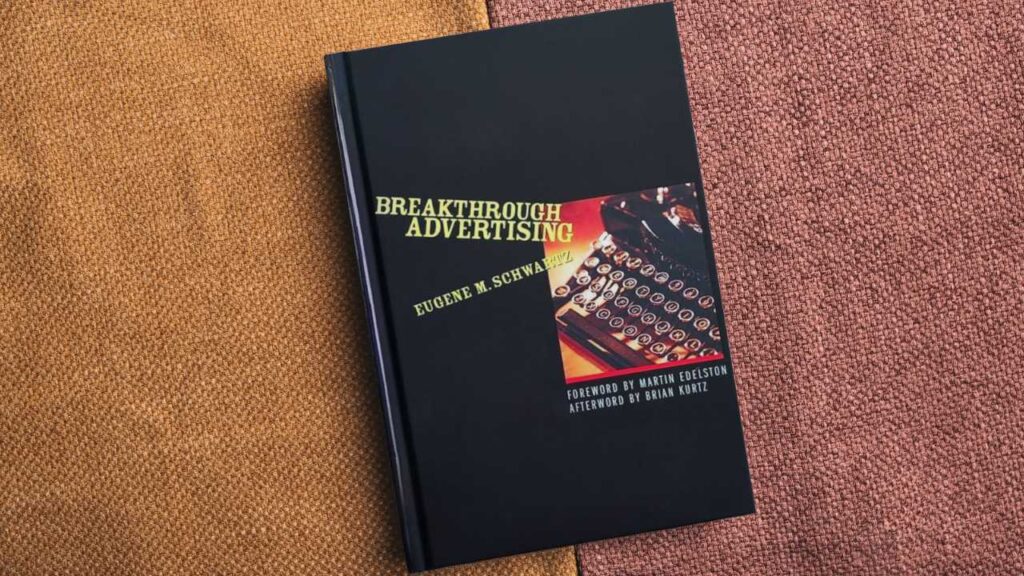
Classic copywriting books are needed now more than ever. With the explosion of marketing technology, AI-generated content, and companies worldwide competing for the same customers, timeless principles are priceless.
Because although AI can generate content, understanding human emotions and psychology, as taught in these books, is essential for creating an engaging and persuasive copywriting piece.
With all our new technology, it’s easy to get pulled away from the fundamentals of copywriting. However, when you combine the fundamentals with modern technology, you become unstoppable.
Breakthrough Advertising By Eugene Schwartz

Breakthrough Advertising is a favorite among copywriters. Eugene Schwartz, a direct-response copywriter who was prolific in the mid-20th century, is a legend.
Breakthrough Advertising is a dense book, and most reviews will only cite the Schwartz lessons from the first half. For example, almost every review will cite Schwartz’s advice that demand for a product cannot be created—only channeled.
(I guess I just did it too.)
That advice about customer demand is indeed sage wisdom to write down and remember forever. But it’s in the second half of the Breakthrough Advertising, which gets little attention, where I find the most gems.
One of those gems is Schwartz writing about the topic of belief.
Belief is the goal, Schwartz states.
If you can channel the tremendous force of his belief—either in content or direction—behind only one claim, no matter how small, then that one fully-believed claim will sell more goods than all the half-questioned promises your competitors can write for all the rest of their days.
A prospect can’t fully accept and value your offer unless you build the necessary beliefs. Your coupons and bonuses will bounce right off your prospects unless they believe your product is right for them.
As an example, Schwartz describes a challenge he had in selling a TV repair manual. Back in the 1950’s, TVs were complex, intimidating machines that broke down constantly, leading to expensive repair bills.
The homeowner could save a ton of money doing TV repairs themselves. The problem was that nobody believed they could actually repair a TV.
Schwartz persuaded prospects they could repair the TV using nothing but his words. He did it through the way he structured his sales letter, strategically targeting belief after belief. You can find the full sales letter in Breakthrough Advertising—it’s incredible.
HOW TO USE THIS BOOK TODAY:
These days, the marketing world is filled with hype and over-the-top promises. Schwartz advises us to dial down those big promises. Instead, focus on building belief. Put yourself in your prospect’s shoes and ask, “What does my prospect need to believe in order to say “yes” to my offer?
If you want more on this topic of belief building in your prospect’s mind, I teach a step-by-step process in my own, Simple Marketing for Smart People.
The Robert Collier Letter Book

Robert Collier built a successful direct-response marketing business by sending simple letters in the mail.
He used letters to sell all sorts of products, from coal (Collier was a mining engineer) to women’s dresses. But he mainly sold books.
The books were typically stories from history, such as H.G. Wells’s The Outline of History, or personal development books around achievement and success. Collier sold over 300,000 copies of his personal development book called The Secret of the Ages.
His letters were clear, compelling, and most importantly—human.
Collier has a way of writing that makes you feel like he’s writing you a personal letter even though has was mailing these letters to thousands of people.
One notable letter was written to mothers and sold a home study course. It has the headline: “There is No University Like a Mother’s Reading to Her Child.”
Really tugs on the heartstrings, doesn’t it? That’s classic Collier.
Now, these letters were not merely for entertainment. He calls the letters he writes “Resultful Letters,” meaning the letters had to lead to results. That is, a purchase.
But it’s Collier’s way of getting the reader to take action (i.e., to purchase the product) that sets him apart.
His approach centers on knowing your reader. Collier states:
Familiarity with the thing you are selling is an advantage, but the one essential without which success is impossible in selling, by mail or selling in person, is a thorough understanding of human reactions. Study your reader first—your product second. If you understand his reactions and present those phases of your product that relate to his needs, then you cannot help but write a good letter.
Wise words for today’s copywriter.
HOW TO USE THIS BOOK TODAY:
Use The Robert Collier Letter to add a human element to your writing. This book is different in that it’s learn by example. There’s not as much teaching as other copywriting books, but rather, you learn from Collier’s example letters, of which there are dozens.
Read Collier’s letters, his commentary, and his approach will sink in. The next time you sit down to write copy, you’ll naturally harness your inner Collier.
Scientific Advertising by Claude Hopkins

Claude Hopkins is a pioneering figure in advertising. His most famous book, Scientific Advertising, is short at just 87 pages. Yet, it’s still constantly referenced for its timeless principles.
In Scientific Adveritsing, Hopkins writes:
The lack of fundamentals has been the main trouble with advertising in the past . . . it was like a man trying to build a modern locomotive without first asserting what others had done.
Hopkins laments that advertising success has felt like too much of a gamble, too much too much like speculation, like betting at the race track.
Do you see how even today, we’re wrestling with the same problem? We roll out a new product launch, ad campaign, or VSL, and it feels like we’re rolling the dice.
Hopkins believed advertising could be a safe and sure venture. But in order to do so, we must learn the fundamentals.
Hopkins then walks through his nearly 20 laws of advertising. He covers everything from headlines to distribution to giving samples. That last law, giving samples, was one of Hopkin’s favorite techniques. He sold a mountain of products by giving away samples. Hopkins believed the product should be its own best salesman.
HOW TO USE THIS BOOK TODAY:
Each of Hopkin’s laws can be applied today. For example, his law of giving samples is easier than ever thanks to shipping across the world being easier than ever.
His law on individuality and adding personality to your copy is critical given the massive amount of content on the internet and the difficulty of standing out.
Weave Hopkin’s laws into your next copywriting project and enjoy the results.
Your Turn
The benefit of learning copywriting from history’s greats is that they weren’t distracted by the internet and modern technology. That meant they put all their effort into the only tool they had—their words.
Study these great books to learn the timeless principles that lead to high-converting copy. Then, combine those principles with modern technology and watch your results soar.
[TAG4]The post 3 Classic Copywriting Books You Need Now More than Ever appeared first on DigitalMarketer.
Frequently Asked Questions
What are five key factors that motivate entrepreneurs?
Motivation is key for success. Without it, nothing could happen. It is the only thing that would make us exist.
Motivational psychology studies the behavior of people when they are motivated. When motivated, we do amazing things. It is also evident that our motivation is limited.
The five most important motivational factors are:
- Autonomy - the freedom to choose
- Mastery – The ability to master your skills
- Purpose - The sense of purpose
- The feeling of belonging - relatedness
- Reciprocity: The desire to give something back
You may feel that these motivators could be applied to your business. In reality, however, each provides a slightly different perspective on why people act as they do.
A person may desire autonomy because he wants freedom and control over his life. Perhaps he is seeking mastery to improve his job.
So on. These are just a few possible motivations. There are many more. Which ones might be relevant for your situation? All of that depends on you.
To find out, I recommend that you write down three words that describe your ideal workplace environment. Next, use those words to describe your current working conditions.
If you struggle to come up with ideas, simply ask yourself why are you doing this. The answer will help you identify your goals.
Once you know what you want, you can begin to figure out where you stand right now. And this knowledge can help to decide whether you should make changes.
You don't have to change anything. It's time you evaluated your options.
To make progress, however, you must first think about ways to motivate your self.
Which of these motivators is most effective? It is difficult to know. Instead of focusing only on one factor, consider all five.
This will help achieve your ultimate goal of being an entrepreneur.
What is your biggest motivation in life and why?
So you're curious about my best motivation in life? Let me tell you. It is the best motivator in my life to make people feel better. To make them realize that they are amazing, because they are. They are worthy love, for they are.
They are entitled to happiness.
It is important to feel great about yourself. Nothing. And I'm going to do whatever it takes to find out how we can change our world for the better.
We feel better about ourselves and are more compassionate towards others when we feel that way. You stop judging people based only on their superficiality. Instead of judging them, you start to see the person within. This is really cool.
Motivating someone by showing them they have everything within themselves is the most effective way to get them to do so.
It may be something they didn't realize, but it's why they've been struggling for so long with something. Because deep down inside they knew they had the power to heal themselves.
All they required was the right environment, the correct support system, and a positive mindset. But somehow they lost sight of that.
It's not hard to see why they lost it. Because they were too busy trying to figure out where the problem came from. They tried to fix it as fast as possible, not realizing they had all the tools necessary to do so.
They also forgot to mention that the main reason they couldn’t solve it was because the answer wasn’t in their heads.
I'm here to remind that you have the power and ability to create a whole new world. All you have to do is learn how to tap into your own inner genius.
Once you do that, everything else will follow. It's easy to make your dreams come true.
You see, I believe everyone has access to their own unique superpower.
Only we have to know how to use it.
What are the benefits to being entrepreneurial?
Entrepreneurship offers many benefits. First, you can become independent. You stop relying on other people.
You can be independent and pursue your dreams. It helps you make connections with other entrepreneurs who share similar interests and challenges.
You gain confidence. You're constantly learning new things as an entrepreneur. This will allow you to be flexible and adapt quickly. This will allow you to think outside of the box and not get stuck in a rut.
Everybody can start their business without being bound by any rules or regulations. We have the freedom to decide what and how to live our lives.
You have the option to choose to go against the flow or follow the crowd. We have the option to choose success or failure. We have the option to either fail or win.
It is exhilarating. This freedom comes with a lot of responsibility. This is because you are accountable for everything happening within your company once you have taken on this role.
To succeed, you have to learn to manage risks. Do not be afraid to try out new things. If you're willing to try to learn from your mistakes, you'll eventually reach your goal.
When you start your journey, remember these important lessons.
Remember:
- Entrepreneurship is a lifestyle choice.
- When you run your own business, you're the boss.
- Be cautious about following the trends.
- You don't measure success in money. It is in freedom.
- Your personal and professional lives must be balanced.
- Set clear expectations.
- Always be sincere with your team.
- Do something about it if you want things to happen.
What keeps you motivated as an entrepreneur?
My greatest motivator is freedom. We live in a world that limits how much we can earn, save money, invest and buy, as well as our ability to borrow, rent, drive or fly. We don't have to live within those limitations. We are free and allowed to pursue our dreams.
We cannot allow ourselves to be enslaved with these limitations. If we do, we lose sight of the fact that we are the masters of our destiny. We are the captains for our ships. We are the architects to our lives.
I am driven by the desire to create wealth beyond my wildest imagination. To build businesses that transcend life. To build businesses that will change the way people live for ever.
To create stronger businesses than any governments, more influential as any religion, and longer lasting than time.
That's why you're here. Entrepreneurs need to grow faster than others. That's why I work hard. Because everyone wins when you win.
What motivates entrepreneurs?
Passion is what drives us. We also have a natural desire to make a difference and create something meaningful. To make a lasting difference for our loved one and ourselves.
To give back. To help others. To leave behind a legacy.
Most importantly, though, we do it because we enjoy doing it. Because we feel compelled by God to live our lives fully and succeed in things that matter.
We are driven by a sense and purpose that cannot be satisfied with money alone.
Find a way for business to be enjoyable. Entrepreneurship can be more than a career; it's a lifestyle.
Because of this, I am passionate about helping entrepreneurs succeed. My goal is to help them achieve financial freedom, and leave a lasting impression on the world.
I am living proof that creating value is better than anything. Sharing your knowledge and expertise with others.
It's not enough just to build a great service or product. To understand your customers and what their needs are, you need to first get to know them. What they are looking for.
It will make you a better marketer and help you improve your product. You will provide more value.
Customers will be more satisfied if you offer more value. If you have more customers, you can sell more products. And if you sell more products and services, you will generate more revenue. In the end, financial independence is possible if you are able to generate more revenue.
You see, money doesn't always mean everything. It's just the means to an end. It's not an end in itself.
You cannot only focus on your money if you want to have a happy life. It is important to make a positive difference. Contributing. Be a part of a legacy. Making something of value. Something unique. You can add meaning to others' lives and your own.
Entrepreneurship requires risk-taking. It doesn't necessarily mean that you have to follow certain rules. It means being flexible. Adapting. Adjusting. Improving.
You will succeed as long you are true and honest with yourself.
Entrepreneurship should be considered a calling. A vocation. An opportunity to contribute. To create wealth. To shape history.
When you embrace all of these things, you will be the best version of yourself.
You will never stop.
How to Motivate Yourself as an Entrepreneur?
It is important to find someone who motivates you to do the things that you want to do. Ask someone who has worked hard towards achieving his goals to tell you how he did it.
Ask for advice, listen and learn, but most importantly, be sure to follow the advice. Admire someone who is successful.
Be the person you want to be. Learn from them. Take their advice. Follow their example.
Keep pushing forward. Keep moving. Never stop learning. Never give up.
Don't listen to anyone who tells you you are incapable. You don't have to believe that there is no way.
You may fail, but that doesn't mean you've failed. Failure is an opportunity that can help you grow. To find out more. To push harder.
Failure is only another step on your journey to success.
So go ahead and get started. Do something today that will move you closer to your dream.
You don't have to wait!
Statistics
- “If you look to lead, invest at least 40% of your time managing yourself – your ethics, character, principles, purpose, motivation, and conduct. (americanexpress.com)
- Invest at least 30% managing those with authority over you and 15% managing your peers.” (americanexpress.com)
- "If you improve by just 1% every single day, in several months, you will have improved by 100%. (carolroth.com)
- I shifted my motivational point from something huge (and undefined) to improve by just 1% each day. (carolroth.com)
- “Life is 10% what happens to you and 90% how you react to it.” (oberlo.com)
External Links
[TAG14]
[TAG16]
[TAG18]
[TAG21]
How To
Which five factors are motivating entrepreneurs?
Entrepreneurs seek financial independence as their main goal. Because they want control over their destiny, entrepreneurs are motivated to become financially independent. They want to make enough money to provide for their families as well as themselves.
They are also driven by the desire to assist others. Many people who run successful businesses don't do it to make a lot of money, but rather for charitable reasons.
Other motivations than these are also possible.
- Passion - Passion is the key to success. Why would anyone else do what they are doing if you don't love it?
- Vision - A vision can be described as a visual representation of the place you want to go. We can imagine ourselves there when we dream. Dreaming can make us feel fulfilled because we know that our dreams are possible.
- Courage - Never fear failure. Instead, face it with courage. Failure is inevitable, but it doesn’t have to define who you are. While failure is inevitable, success is still possible if we keep going.
- Belief - Believe in yourself. Do not allow doubt to keep you from achieving the goals that you set. Fear is often the cause of doubt. Fear keeps us stuck in our comfort zone. Don't be afraid to get out of the comfort zone and set your sights on your goals.
- Persistence - Do not give up, no matter how difficult it seems. Everybody fails at times. However, if perseverance is your key to success, you will achieve your goals.
Did you miss our previous article...
https://consumernewsnetwork.com/technology-news/crafting-effortless-sales-through-wow-moments-in-experience-marketing






